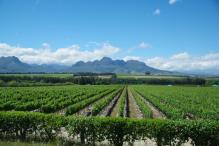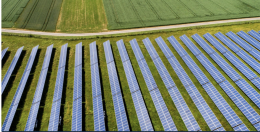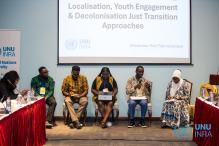The agrophotovoltaics (APV) concept proposes the development of energy production systems based on photovoltaic solar technology, in harmonious and optimised combination with agricultural production. Mali and The Gambia are located in one of the most vulnerable regions to climate change as temperature increases are projected to be 1.5 times higher than in the rest of the world. The promotion of food security has been a top priority in both countries. This has resulted in a push for more irrigated areas demanding the extraction of more water and energy for pumping water from groundwater and surface water. There has been an increasing scarcity of arable lands and in the upcoming decades, rural areas in Mali and The Gambia will face severe challenges resulting from climate change. APV-MaGa is a research and development (R&D) project that aims at establishing Agrophotovoltaics as a sustainable energy system that provides food, water and electricity to the local population while increasing resilience of the agriculture sector against climate change. Additionally, the project seeks to proof the technical and economic viability of an integrated triple land use system and to gain a deeper understanding of synergies and interactions within the Water-Energy-Food Nexus in the partner countries and West African context. As per demand from the African partners, the five APV approaches will be exploited and suitable business models related to the local context will be tested.
The APV approaches includes: A 200kWp demonstrator to be installed on an approximately one hectare of land reserved for research activities at the Rural Polytechnic Institute of Training and Applied Research (IPR/IFRA) in Katibougou, Mali; and Four APV pilot demonstrators ( which includes irrigated rice farm, an integrated rainwater harvesting APV pilot plant, a transformation platform and a cold storage facility for agricultural products) with a capacity of approximate 62.5kWp each to be installed in selected communities in the Gambia. The different pilot projects are installed to optimise the use of the generated electricity and to ensure profitability from crop yields for the local communities.
Sufficient and reliable water supply is very important for the agricultural sector. On the other hand with the intensification of human activities and increasing water demand will require a strategic use of water resources in a changing climate. The key role of United Nations University – Institute for Environment and Human Security (UNU-EHS) is to conduct research and develop solutions that contribute in the use of water in an efficient, sustainable and integrated manner within the system and the surrounding environment. This takes into account water availability and water demand under the consideration of i) drought and flood conditions, ii) climate change impacts and iii) the APV system that supports equitable, economically feasible and climate-proof water allocation planning. An intelligent systems based on smart sensors, microcontrollers respectively Internet of Things will be designed to monitor and collect real time data for water demand and water allocation for irrigation systems. Further UNU-EHS will support in the development of a web-access in order to provide information on agricultural products and organised payment for various services offer to the community.
UNU-EHS is in a consortium with partners from Germany: Fraunhofer Institute for Solar Energy Systems Freiburg, deea solutions GmbH Frankfurt am Main, University of Freiburg and partners from Mali and The Gambia: Rural Polytechnic Institute of Training and Applied Research of Katibougou, Mali, Malian Awakening Association for Sustainable Development, West African Science Service Center on Climate Change and Adapted Land Use – (WASCAL) both in the Gambia and Mali, Ministry of Secondary, Higher Education and Scientific Research in Mali (MESSRS) (Associate Partner), Food and Agriculture Organization of the United Nations Technical Office (FAO Gambia), National Agricultural Research Institute, Nadji.Bi Ltd Gambia, University of The Gambia, Ministry of Higher Education, Research, Science and Technology, The Gambia (Associate Partner) (MoHERST), Namene Solar Ltd Ghana (Associate Partner). The project is funded by the German Federal ministry of Education and Research (BMBF).





